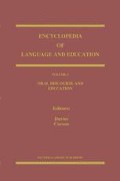Abstract
Recognition of the centrality of spoken language in the processes of children’s learning has led to changes in the educational status of talk throughout the English speaking world. The relationship of language to learning has been a major topic of inquiry since the late 1950s. During the 1960s psychologists identified oracy as a crucial component of learning, and during the 1970s the relationship between spoken language and thought in young children was firmly established. The foundations for the study of children’s collaborative talk were laid by researchers coming from different disciplinary backgrounds including developmental psychology, sociolinguistics and classroom studies.
Access this chapter
Tax calculation will be finalised at checkout
Purchases are for personal use only
Preview
Unable to display preview. Download preview PDF.
References
Ahern, T.C.: 1994, ‘The effect of interface on the structure of interaction in computer-mediated small-group discussion’, Journal of Educational Computing Research 11(3), 253–260.
Alexander, A.: 1992, Policy and Practice in Primary Education, Routledge, London.
Barnes, D & Todd, F.: 1977, Communication to Curriculum, Penguin, Harmondsworth.
Bennett, N. & Desforges, C.: 1985, Recent Advances in Classroom Research, Scottish Academic Press, Edinburgh.
Bennett, N., Desforges, C., Cockburn, A & Wilkinson, B.: 1984, The Quality of Pupils’ Learning Experience, Lawrence Erlbaum Associates, New Jersey.
Bourke, S.F., Clark, M.L., Davis, D.F & Holzer, F.: 1980, Oracy in Australian Schools, ACER, Melbourne.
Brown, A.L. & Campione, J.C.: 1990, ‘Communities of learning and thinking, or a context by any other name’, in D. Kuhn (ed.), Developmental Perspectives on Teaching and Learning Thinking Skills, Karger, Basle, 108–126.
Bruner, J.S.: 1996, The Culture of Education, Harvard University Press, Cambrige, MA.
Cazden, C.B.: 1988, Classroom Discourse: The Language of Teaching and Learning, Portsmouth, Heinemann Educational Books, New Hampshire.
Corson, D.: 1988, Oral Language Across the Curriculum, Multilingual Matters, Clevedon, OH.
Corson, D.: 1993, ‘Discursive bias and ideology in the administration of minority group interests’, Language in Soviety 22, 165–191.
Corson, D.: 1995, Using English Words, Kluwer Academic Publishers, Dordrecht.
Dembo, M. & McAuliffe, T.: 1987, ‘Effects of perceived ability and grade status on social interaction and influence in cooperative groups’, Journal of Educational Psychology 79, 415–423.
Department of Education & Science: 1975, A Language for Life (Report of the Bullock Committee of Inquiry) HMSO, London.
Edwards, D. & Mercer, N.: 1987, Common Knowledge: The Development of Understanding in the Classroom, Routledge, London.
Edwards, D.: 1990, ‘Classroom discourse and classroom knowledge’, in C. Rogers & P. Kutnick (eds.), The Social Psychology of the Primary School, Routledge, London.
Edwards, D.: 1993, ‘But what do children really think? Discourse analysis and conceptual content in children’s talk’, Cognition and Instruction ii(3/4), 207–225.
Galton, M., Simon, B. & Croll, P.: 1980, Inside the Primary Classroom, Routledge & Kegan Paul, London.
Galton, M. & Williamson, J.: 1992, Group Work in the Primary Classroom, Routledge, London.
Holden, C.: 1993, ‘Giving girls a chance: Patterns of talk in co-operative group work’, Gender and Education 5(2), 179–189.
Johnson, D.W. Maruyama, G. Johnson, R. & Nelson, D.: 1981, ‘Effects of cooperative, competitive, and individualistic goal structures on achievement: A meta-analysis’, Psychological Bulletin 89(1), 47–62.
Leal, D.J.: 1992, ‘The nature of talk about three types of text during peer group discussions’, Journal of Reading Behaviour XXIV(3), 313–338.
Lehr, S.: 1991, The Child’s Developing Sense of Theme, Teachers’ College Press, New York.
Lewis, J. & Cowie, H.: 1993, ‘Cooperative group work: promises and limitations: A study of teachers’ values’, Education Section Review 77-84.
Lipman, M.: 1988, Philosophy Goes to School, Temple University Press, Philadelphia, PA.
Lyle, S: 1996, ‘An analysis of collaborative group work in the primary school and the factors relevant to its success’, Language and Education 10(1), 13–32.
Mercer, N.: 1995, The Guided Construction of Knowledge: Talk Amongst Teachers and Learners, Multilingual Matters, Clevedon.
Norman, K (ed.): 1992, Thinking Voices: The Work of the National Oracy project, Hodder & Stoughton, Sevenoaks, Kent.
Oakes, J. & Lipton, M.: 1990, Making the Best of Schools: A Handbook For Parents, Teachers and Policymakers, Yale University Press, New Haven.
Orsolini, M. & Pontecorvo, C.: 1992, ‘Children’s talk in classroom discussions’, Cognition and Instruction 9(2), 113–136.
Prawat, R.S. & Floden, R.E.: 1994, ‘Philosophical perspectives on constructivist views of learning’, Educational Psychology 29(1), 37–48.
Scardamalia, M. & Bereiter, C.: 1991, ‘Higher levels of agency for children in knowledge building: A challenge for the design of new knowledge media’, The Journal of the Learning Sciences 1, 37–68.
Sinclair, J.M. & Coulthard, R.M.: 1975, Towards an Analysis of Discourse, Oxford University Press, Oxford.
Steedman, C.: 1982, The tidy house: Little Girls’ Writing, Virago, London.
Swing, S. & Peterson, P.: 1982, ‘The relationship of student ability and small-group interaction to student achievement’, American Educational Research Journal 19, 259–274.
Webb, N.M.: 1982, ‘Group composition, group interaction, and achievement in cooperative small groups’, Journal of Educational Psychology 74, 475–484.
Wells, G.: 1989, ‘Language in the classroom: Literacy and collaborative talk’, Language and Education 3(4), 251–273.
Wegerif, R. & Mercer, N.: 1996, ‘Computers and reasoning through talk in the classroom’, Language and Education 10(1), 47–64.
Wood, D. & Wood, H.: 1988, ‘Questioning versus student initiative’, in J.T. Dillon (ed.), Questioning and Discussion: A Multidisciplinary Study, Norwood, Ablex.
Wood, D., Wood, H., Ainsworth, S. & O’Malley, C.: 1995, ‘On becoming a tutor: Towards an ontogenetic model’, Cognition & Instruction 13(4), 565–581.
Young, R: 1988, ‘Critical teaching and learning’, Educational Theory 38(1), 47–59.
Author information
Authors and Affiliations
Editor information
Editors and Affiliations
Rights and permissions
Copyright information
© 1997 Springer Science+Business Media Dordrecht
About this chapter
Cite this chapter
Lyle, S. (1997). Children’s Collaborative Talk. In: Davies, B., Corson, D. (eds) Oral Discourse and Education. Encyclopedia of Language and Education, vol 3. Springer, Dordrecht. https://doi.org/10.1007/978-94-011-4417-9_20
Download citation
DOI: https://doi.org/10.1007/978-94-011-4417-9_20
Publisher Name: Springer, Dordrecht
Print ISBN: 978-0-7923-4930-3
Online ISBN: 978-94-011-4417-9
eBook Packages: Springer Book Archive

